#Holy shit A Study of Resonance was actually insane
Explore tagged Tumblr posts
Text
Sometimes all you need to become utterly obsessed with a ship you'd never even thought of before is a single fanfiction...
#This is about Tompercy btw#Holy shit A Study of Resonance was actually insane#I fear my may never be normal again#I was already un-normal about Percy and now you add Tom fucking Riddle into the mix???#Anyway everyone go read it right now.#Its on Ao3#tompercy#percy weasley#tom riddle#harry potter#hp#hp fanfcition
32 notes
·
View notes
Text
Have you ever gotten a surprisingly good grade on a school assignment that was worth a lot of points? Why was it a surprise to you that you got a good grade? (ex. you did put much effort into) This is bad, but I admittedly at times completely BS’d an assignment or paper and still got a good grade. :X Like, one example is where I didn’t end up reading the assigned chapters of a book one time for some reason, which wasn’t like me, but managed to write up a page or so summary of what was talked about in the chapters and got an A on it. It definitely appeared as though I had read it. The teacher even wrote something about how it was well written and I seemed to be grasping the material. lmao.
Do you tend to get sick more often in the wintertime? If not, is there a certain season that you get sick more often in besides winter? It’s usually with the changing of seasons/weather.
Do you find yourself being more of a germaphobe when you’re in public? Especially in a 2020 covid world.
What is the worst thing you’ve seen in a public restroom? Shit left in the toilet. I’ve heard way worse stories from people who work in retail and have had to clean the bathrooms, though... *BARF*
Nerdy question time. If you were in a more medieval time period, would you prefer to excel in might, magic, or finesse? Finesse.
Do you have any friends from foreign countries? Are they online friends or foreign exchange students? Or perhaps you have some from both? Some of you guys in our survey community are from outside the US. Hiiii.
Have you ever studied how your last name originated? I’ve looked up its origin in the past.
What is one recipe that you would like to learn how to make? (Can be anything from breakfast to dessert.) I’m not a cook or a baker, so I don’t really care to learn how to make anything.
When you are around people for too long, do you find yourself wanting some “me time?” Or do you prefer to be around people frequently? Oh, most definitely. I get exhausted, drained, and feel my mood sinking.
Is there any specific reason why you prefer to take a shower in the morning or night? (ex. I prefer to shower at night because I don’t want to get up early. Silly reason, but oh well) I find it relaxing to shower at night before bed.
Are there bands/artists out there that make you feel like they are singing about your life? If so, which bands/artists are they? There’s been many songs that I related to/resonated with that felt they were written just for me. Not always the whole song, but certain lyrics that just really speak to me.
Even if you are not into sandwiches, what would be your perfect lunch sandwich? I’ve been skipping out on lunch lately to be honest. For the past month or so now my first meal isn’t until dinnertime, which is around 8PM.
How many hours can you go after a meal before you are hungry again? Does the time vary off how big of a meal it was? Well, like I said I’ve been skipping out on lunch lately and not eating until dinner, so I’m going almost 20 hours before my next meal. Holy shit... I never actually thought of it that way... yikes. I feel I should mention I have my nightly bowl of ramen after dinner like 4 hours later, but still... I guess cause for most of this year I’ve been sleeping in late, like late afternoon (2-3PM), sometimes early evening (like after 4PM), and I don’t like eating right when I get up so I end up eating late. However, I usually would eat something around 4 or 5PM on days I got up around 2 or 3PM, but now I’m just waiting until dinner. I’ve been sleeping in until like 4, sometimes 430PM more often, too, which adds to it. Sigh. I’m a serious mess...
How do you feel about holiday shoppers? I just don’t understand the craziness of Black Friday. Like to see people physically fight over items is absolutely insane. Or waiting in line outside for several hours, sometimes camping out there, is ridiculous.
Do you have anything significant planned for your winter break? Assuming you are in school. If not, sorry. I’m not in school.
2 notes
·
View notes
Text
#nunlife
A lot of people ask me what #nunlife was like and why I left. So I’m answering some of that here in various parts because #nunlife is so multi-faceted, happens in steps and in 8 years I experienced many sides of it! Also, the reasons why I left deserve some space, thought and clarity. 😊 While I do get saucy in various parts because lots of my #nunlife was kinda cray, I also would not change my time in the convent because it has brought me to where I am now, a space and a life that is full and bright. So even though I call out some of the bullshit antics here and in other places I’ve written, I also still hold much love for the actual humans who I grew up with there (I was age 22-30 in the convent, with many of the same) and who I know are still living that life with good intentions. Also, I know there are many former nuns who prefer not to revisit convent life or remember things, which I honor. For me, I have no problem sharing (really?!) any parts of it - the good, the bad and the ugly. And honestly, sharing has helped me to make others aware and also reap the wisdom from those years for my own life and spirit.
Below is everything from our insane schedule, sleeping on pieces of wood to chauffeuring the priests around. Also the cool stuff like traveling to the White Mountains of New Hampshire every summer, playing volleyball and getting a new name. Oh and why the sound of a bell is semi-ptsd for me!
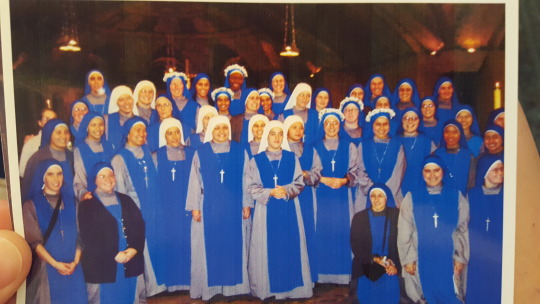
In adjectives only, nun life was: fun, challenging, quiet, loud, sacrificial, routine, adventurous, exhausting, annoying, ignorant, blind, well-intended, broken and beautiful. Full of humanity, right?!
What order? I entered The Servants of the Lord & the Virgen of Matara (ssvm), they are the female branch of the larger Religious Family of the Incarnate Word, mostly a missionary catholic priesthood, originally founded in Mendoza, Argentina in 1984. (www.ive.org; www.iveamerica.org) The order has definitely had it’s fair share of shadiness that has recently come to light, but honestly none of that had any personal, major effects on my life or leaving. The sisters were founded in 1988, marking 30 years this year (www.ssvm.org; www.ssvmusa.org) They are a catholic missionary order and so when I met the ssvm while attending Catholic U. in DC, they had only been in the states for maybe a handful of years. They only had probably 7 American sisters, most of them still in formation. I think my class was probably only the 4th or 5th class here in this province (which now includes USA, Guyana, Surinam, Mexico & Canada!) Still to this day, the Novitiate formation houses for both the men and women resides in Maryland, very close to DC.
Entering the Convent: I entered at age 22, only 9 months after graduating college. I entered the Novitiate House/Convent, where both postulants and novices lived together. Postulancy is the stage upon entrance until a girl receives her habit & religious name. At this point, that is usually a year or longer. For me, back in the early days of SSVM in this province, it was only 11 months and for some of my classmates, it was only 1-4 months. The order did not have a certain level of church approval yet (it only had local ones or something,) so we didn’t yet have to follow canonical rules, which was fine and semi-normal.
When I entered, there was a novice class already living in the house that consisted of all Americans and 1 Philipina. They were about 8. My class that followed was also 8, but we were much more diverse: 3 Americans, a pair of Pakistani twins (truth), 1 Haitan, 1 Mexican and 1 Guatemalan. Of the 8 of us, only myself and the Mexican girl eventually left. Of the novice class before me, 4 remain and 4 left. The ones who remain have been and are still in various missions all over the world such as Italy, Tunis, France, and various places across the US.
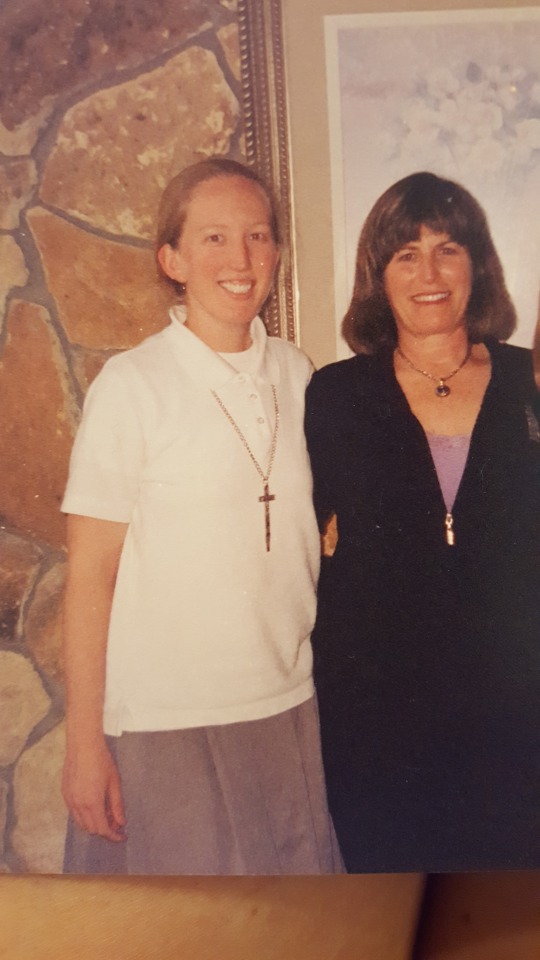
My Religious Name: Technically now after about a year of postulancy, the sisters are given their religious names in a special, fancy ceremony and Mass. We were allowed to propose names, but also ultimately our superiors chose them for us. The name given to me was: Sr. Maria Lumen Christi, which is Latin for Sr. Mary, Light of Christ. I loved the name and really resonated with it. As all of us were named after Mary in some fashion, we went by the 2nd part, so I was Sr. Lumen, or just Lumen (as we called each other) for the next 8 years. (I still feel that my “calling” here is to Be Light, so that name still is most definitely a part of my being from all eternity.)
Novitiate Life – Koolaid Initiation: I spent about a year and ½ in this house and for the most part, it was pretty fun and I loved it. It was actually a house in a small Bowie, MD neighborhood that had been turned into a convent (which only meant that 1 room was created into a Chapel basically.) It had 4 bedrooms upstairs that were stocked with bunk beds (except for the Superior’s room,) a kitchen & dining room, a library room, a study/classroom, the chapel and a backyard where I played my first volleyball games. At our smallest, we were probably 8 or so, and at our largest in that house we were probably around 20, definitely more than allowed. The class who entered after me was large, to the point where we set up bunks in the library and in the garage that summer, until my class moved out to the Juniorate House in DC that Fall. It was community living at it’s best.
Everything in convent life was scheduled. We had a weekly schedule, divided into the days, divided into hours, marked by the bell ringer, which was an actual job. (To this day, whenever I hear a certain tone of bell, I am brought right back – it’s semi-ptsd and semi-nostalgic for me! Truly.) These years were basically learning how to live like a nun, how to live in community, as well as studying the catholic faith. A normal day in the Novitiate House might look like this:
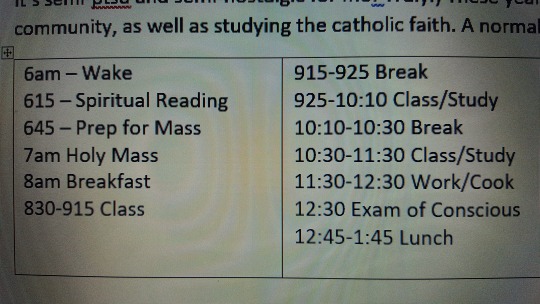
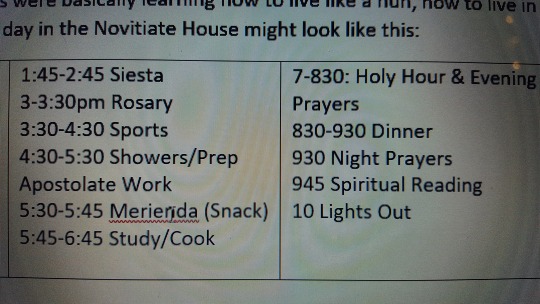
Take a good, long look at that one!
If anyone ever gives me shit for being slightly cray about my personal time, tell them to go live that life for 8 years and get back to me!
Work duties consisted of various tasks to keep the house in order: cleaning, laundry, sacristy (taking care of the things in the chapel), cook (not cooking every meal, but meal planning for the house & coaching those of us who had never cooked in our lives!), librarian, liturgy (prepping all music & songs for Mass & prayer) etc. There were also sisters in charge of sports and recreational activities. There were also “drivers” – as some, but not all of us could drive. Picking and dropping of the priests for Mass (yes, that was a thing…don’t get me started) and various other things we needed them for was a daily task. In this house, there were only 2 showers, 1 phone line and maybe 1-2 computers. Needless to say, we all learned about community in very real ways.
While the novitiate years were mainly focused on community life and study, with some apostolic work on weekends (like teaching ccd, etc) once a sister left the novitiate, she entered the Juniorate House of Studies, where all of that only intensified & multiplied.
Below: the novitiate and juniorate houses present day. The superiors and lead sisters in these houses were girls I lived with for many years.
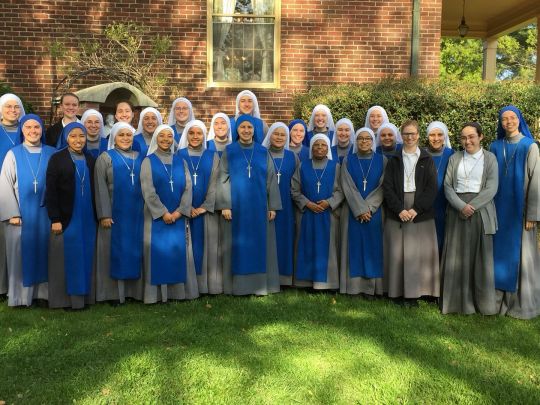
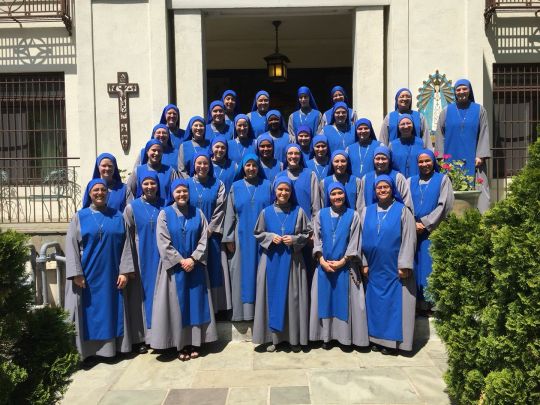
Juniorate House of Studies – A Whole Lotta Crazy: A sister usually would
spend 2-3 years here and begins her life in this house only after her first profession of temporary vows (poverty, chastity and obedience.) It was all the things above – including the hour by hour daily schedule complete with large bell ringing & everything - except everything was more – classes, responsibilities, hours awake, hours driving, cleaning, cooking for more, etc. It was meant to be a harder, more demanding lifestyle, in preparation for “missionary life.” The house was huge, there were 2-3 classes of sisters living together, usually over 20 of us, plus the superior and formators (older sisters who help the superior in various specific arenas like discipline & studies.) (Again, if ever anyone wonders why I revel in living alone…!!!!) Thankfully there were way more bathrooms and showers here, but sadly it was in SE DC, so there was not a yard to play in, but we had access to the school gym which is where we would play volleyball and basketball about once a week if we were lucky. Sleep here was less, despite the fact that work was more. We would rise at 6 I think, but usually were not in bed until 11pm. If you had to pick up Father, you were up at probably 515am. While there was still a siesta scheduled in the Juniorate, very often sisters would catch up on work or study during that hour because there was just not time enough in the day to keep ahead of the game. While it sounds like nun-studies might be an eye roll, the order is actually super academic and takes studies very seriously. We learned some high level philosophy, metaphysics, church history, roman history, not to mention Latin, Spanish and Italian studies. A shit ton of church documents, papal letters, names, dates, etc. It wasn’t just make sure you know the Saints and the 10 commandments. This order knows their Catholic doctrine, history and all of the Church documents really intensely. So, classes, studying and exams were very real and for some caused a great deal of stress.
Despite the demanding schedule and responsibilities, these years were probably the most fun and enjoyable for me, because I was not in charge and didn’t have enough time to realize how much I naturally disliked a lot of people and a lot of movement, ha! I was too busy people pleasing and trying to be a good, docile, generous nun! But honestly, a lot of us were around the same age – 18 to early 30s – and generally had a great time together. There were a shit ton of cultural differences that we all were challenged by and eventually learned to honor, as they all made us more open and wiser. Meals together, sports, road trips to other convents or shrines or holy sites, recreation and games, and religious feasts and celebrations were usually joyful & lively, with an abundance of good food, guitar playing and lots of songs. We celebrated the various represented cultures with feasts of ethnic food, drinks, music and ceremonies. Every summer, we would drive up to the White Mountains of New Hampshire for vacation. We would spend a month hiking those awesome mountains, swimming in lakes, camping, playing volleyball, barbecuing and singing around the campfires. Those were also pretty amazing times, despite the on-the-go routine and lack of sleep!
Things to notice about these years: the young ages, the lack of free unstructured time, the lack of sleep, the dozens of hours being taught by a superior or priest (read: Koolaid,) the lack of time alone, catering to the priests…Anyone who knows me, knows that I do think the life was and is a cult...I just never noticed it until years later. (Still wouldn’t change it though! lol!)
Deny Thyself: Penances, YAY!
Some things that are rarely brought up in conversations about #conventlife are the physical penances. As most people know, Catholics practice various forms of penance. Our order was and is very old school, orthodox Catholic and so the physical penances were very much a part of the spirituality and practice. This may be new or surprising or crazy to you, but for us it was pretty freaking normal and eventually not a big deal. I understand if you read this and think that we were like trying to live in the 1500s. It was like that sometimes!
o Fasting: every Friday of the year (except a few) it was encouraged to fast until dinner. This was always optional. There were all kinds of ways to fast, including removing sugar or milk from coffee, only eating bread or fruit, etc. There were a zillion ways to deny the palate & appetite and we were allowed to do whatever worked for us.
o Hair shirt: this was introduced in the Juniorate and we could wear it in accordance with what our spiritual director allowed. It was basically a lightweight chainlink belt that we wore around our waist, under our habit, as a penance – to remind us that we are sinners, or to remind us ‘what Christ suffered for our sins.’
o Self-flagellation: also a thing! In the juniorate, we were given a medium sized whip made of rope, I don’t remember the name. At least once a week, we would perform community self-flagellation, on our knees, at night before we all went to sleep, usually to the duration of a decade of the Rosary (a few minutes.) This may have increased during Lent, like 1 extra day a week. Since it was an obvious thing, it wasn’t easy to do it secretly. I’m sure many of us also performed this penance during silent retreat weeks and months.
o Sleeping on Wood: I discovered this option for penance at a visit to a NY convent, when I was still in the Juniorate. Girls would elect to remove their mattress and use a similar size piece of plywood to sleep on. I asked to do this my last year in the Juniorate and slept this way my 4 years in Harlem.
These are just the main forms I remember, and only physical penances. There were a zillion other ways we learned to “deny ourselves” throughout the day mentally, emotionally, etc. But I thought the physical was worth noting since I would guess most folks don’t think these types of penances still exist, except in some strict monastic convents maybe. Well, they do!
And on that fun note, I will end this post!
Up next: Sent to Spanish Harlem!
#myponderings#nunlife#catholic#catholiclife#catholicchurch#patriarchy#convent#conventlife#ssvm#ive#nuns#religious#sisters#novitiate#postconvent#exnun#penance#othodoxcatholic#ponderings
4 notes
·
View notes
Photo
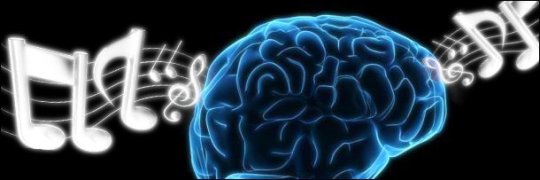
7 Insane Ways Music Affects The Body (According to Science)
By Anthony Jurado
The world is chock full of ear hurt that some people willingly refer to as music. The Jonas Brothers, Lady Gaga, Conway Twitty; they all produce high quality records and 8-tracks for our enjoyment whether we like it or not. But music--even terrible music--has a stunning amount of power over our bodies. For instance science says music can... 7 Repair Brain Damage Slapping neuroscience right across the face, music is able to take stroke, lesion or other brain-damaged patients who have lost the partial ability to see or speak and return it to them. The Kenny Rogers Effect--not named because it deals with gorging yourself on chicken or replacing your old, grandfatherly face with a shiny new rubber one--takes patients with visual neglect, the inability to recognize half of what they see, and lightens the effects of the damage. Patients who only shave half their face or grab for the right boob at a strip club can now put that dollar bill in the left or right side of her thong. The Gambler never stops being awesome. Patients with left-side brain damage who can no longer speak can find they are able to sing words, often without trouble or training. After that, it's just a matter of time before they're able to speak simple sentences with practice. That may not sound like much, but if you've ever tried to order a side of fries with left-hand only charades you'll understand what a blessing this can be. How Does it Work? Melodic intonation therapy, or singing until you can talk, takes advantage of the fact that language functions are located in the left brain, but music lives over on the right side of the brain. So, when that asshole stroke robs you of your ability to speak, you can train your brain to move those functions to the other side by associating music with language. This essentially rewires a lifetime of growth and an entire history of evolution into meaninglessness interpretations of random head noises from a guy who hasn't shaved his beard since the 70s. Listening to actual non-terrible music has an additional effect, since pleasurable music releases dopamine that simply makes certain parts of your brain function better (particularly if they were damaged before). Dopamine is your brain's natural crack In a nutshell, music gives your brain a massage and fills it with happy chemicals, turning you from a one-eyed mute into an Island in the Stream. 6 Kick an Addiction As it turns out, performing music can be relaxing and can create a distraction from withdrawal symptoms; songwriting can help patients confront impulse control and self-deception and allows an output for negative emotions; hence the entire songbook of Raffi. It has even been found that listening to music can help aid the detox stage of recovery from drug addiction, and if applied frequently could cut down on the number of pain-killers patients need. Indeed, it turns out GWAR may be just as helpful as Percocet. How Does it Work? Music directly affects chemicals called neurotransmitters which relay information in our head. Drugs work in a similar way, except they make your brain lazy and convince it to stop making its own chemicals, because why do work when sweet China White is there to making everything all better? But when you stop taking drugs, your brain isn't making enough chemicals and it doesn't know why because it relies on those drugs to get enough, so your body fails to function correctly and you turn into Joaquin Phoenix. Introducing music can increase levels of some chemicals associated with heavy addictions, like dopamine and norepinephrine, but significantly cuts back on suzziness and the willingness to give blowjobs for your next fix. In addition, certain music lowers things like heart rate, blood pressure, muscle tension, etc., that make you feel like killing everybody around you. Apparently the fact that half of the world's rock stars still wind up dead from overdoses despite music's addiction-breaking qualities is a testament to just how much those guys fucking love doing drugs. 5 Boost Your Immune System It may come as no surprise to all the Cracked readers who are also neuroscientists that music helps boost your immune system. For the rest of you, word is that intangible plinking noises can create a noticeable increase in recovery from a wide range of conditions, including heart disease, lung ailments and even the common cold. While the field of study is still young compared to fancy "real medicine" like "pharmaceuticals" and "penis phrenology" it turns out that sometimes all you need to overcome your horribly debilitating illness is AC/DC. How Does it Work? Music, like Jurassic Park's raptors, doesn't just attack from one side. That shit brings out a multi-pronged assault. To start, music reduces stress by reducing cortisol levels, a chemical in your brain that causes you to feel stress in the first place. Jazz, bluegrass and soft rock have been found to be especially effective at reducing stress and increasing health because of their similar musical qualities (that quality being that you don't listen to any of them). If you're wondering if your favorite music is helping your health, a good question to ask is, "Does this music make me want to riot?" If you answered yes, it's not an optimal medicine. Likewise, if your favorite musician's last name is Cyrus you're probably dooming yourself to a life of erectile dysfunction and diabetes. In addition to simply lowering stress levels, music also raises immune markers in your system, creating more antibodies to fight disease. Ironically, listening to Amy Winehouse could make you immune to all the potential diseases you'd be exposed to if you met Amy Winehouse. This effect is compounding: Over time, the body can learn to recognize certain types of music (particularly choir or classical music) as immune boosting, continuing the improvement of the immune system. As an added bonus, if you listen to choir music on a regular basis you're almost guaranteed to be immune to STDs as the odds of you ever having sex are quite slim. 4 Prevent Seizures Good news: If you're not one of those 150 suckers who get seizures from music, you may be one of the luckier ones who benefit from decreased seizure activity as a result of listening to music. This effect has even been observed in coma patients. Bet you feel better about being in a coma now. It's been shown that music by Mozart played on the piano reduces seizure-causing activity in the brain within five minutes of exposure, with many cases showing immediate results in what scientists should called Seizure Wolfgang-banging. Experimentation with other forms of music has been minimal, but for some reason there appears to be a connection between our brains and piano music. How Does it Work? It's theorized that "the superorganization of the cerebral cortex . . . may resonate with the superior architecture of Mozart's music" which is a sciencey way of saying that probably Mozart gets all up in your brain in ways the Hamburger Helper jingle only wishes it could. Really though, this is another one of those medical shrug moments, as scientists really haven't figured it out yet. Kind of unfulfilling, isn't it? "Mozart music hits a certain part of... There's a connection between the structure and a brain's... You see, with brain music... Oh fuck you, it just works OK?" 3 Return Lost Memories If you want music to help you but refuse to stop smoking pot, perhaps you can at least remember where you put your car keys. Or, more applicably, if you have Alzheimer's it could help you remember pieces of your past. Medical practitioners have found that music shows the potential to unearth memories associated with music for patients, even ones in late stages of dementia. So if you had your first kiss to the dulcet tones of Jefferson Starship, their terrible, terrible music could bring that memory right back for you. How Does it Work? Listening to music engages many areas of the brain in both hemispheres, which is why it can create brain activity other methods, like conversation, can't. Another area it engages is the hippocampus, which would be a hilarious name for a school for aquatic mammals but in reality is the less impressive region of the brain which handles long-term memory storage. When you listen to music you know, feelings associated with the song are returned by the hippocampus. Sometimes the memories even manage to come along with the relevant feelings, so hopefully no music was playing the first time anyone ever kicked you in the junk. Even if memories aren't recovered, emotions and attitudes are, allowing people who can't even remember who they are from day to day or why they loathe the FOX network so much to at least laugh and sing along with off key hopefuls on American Idol. 2 Increase Spatial Reasoning If only there were some way to make yourself seem smarter without working. Oh, wait, there is. Mozart music, especially piano music, can raise your spatial reasoning the equivalent of nine IQ points. And that's an average, meaning there are people who get even more of a boost from it. That's over half a standard deviation or the difference between being Leonardo DiCaprio in What's Eating Gilbert Grape or Leonardo DiCaprio in Titanic. Sure, you're not winning a Nobel Prize either way, but it's still a noticeable difference. How Does it Work? There are a lot of theories, but some claim that Mozart's music focuses the listener more, like how if you're in the midst of your sixth hour of questing in World of Warcraft you can still rain holy hell down on Hogger as long as you're listening to Ace of Spades. Others say it increases activity in crucial regions of the brain and a few industrious types say "who cares why it works, how can we make money off of this?" 1 Cure Parkinson's At this point, you may be asking, "Sure, music can fix my brain, but can it fix my body?" which would indicate you expect entirely too much from iTunes. No amount of power ballads is going to cure your heartburn or trim a few pounds off anyone's overly-gelatinous ass. However, if you have Parkinson's disease, it just might be able to help. Victims of Parkinson's suffer from muscle spasms, locking muscles, balance problems and sketchy scientists with kick ass time machines. As it turns out, applying music can instantly resolve the physical issues of Parkinson's in many victims. Take Rande Gedaliah, who was diagnosed with Parkinson's in 2003 and found she had muscle spasms, balance problems and difficulty walking. The disease eventually led to a serious fall in the shower. Things were looking pretty grim until one day she found out she could listen to music and suddenly be able to move with ease, the type of music determining the speed she walks at. We Are the Champions let her walk a slow clip and Born in the USA made her move faster still. Anything by Nickelback sent her spiraling into a rage. Ancient warriors listened to their Nickelback equivalent, thrashing and scraping bones on rocks, to produce a similar effect before combat. How Does it Work? When you're locked in your room, listening to your old N'Sync CDs, have you ever noticed your foot tapping on its own? That's not just because you have terrible taste in music. It's because the portions of the brain which deal with rhythm and movement are so automated that it requires no conscious attention to move to a beat. It's like your brain going behind your back to get things done because it knows it can't rely on you to bust an appropriate move when you hear "Bye Bye Bye." This movement isn't handled by the same process as walking up the stairs or hilariously farting with your armpit. Suddenly, patients with bradykinesia--an inability to initiate movement--can move instantly as their brain interprets the music and sends movement signals to their legs, essentially tricking their bodies into moving. We'll say that again for you: Music can trick your broken, unresponsive body into obedience. Think about it: How many times have you thrown your hands in the air? When that happened, did you just not care? Science says that's because you had no control. Music also helps other Parkinson's-related issues, including loss of balance and spasms. It's also been found that playing music creates an improvement in people with the disease, and drum circles are being used as treatment in music therapy groups, presumably because drums are cheaper than fancy-ass medical equipment, anyway.
http://www.cracked.com/article_18405_7-insane-ways-music-affects-body-according-to-science.html
0 notes